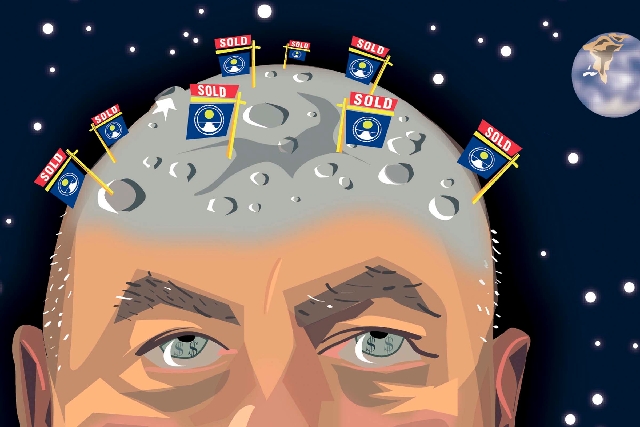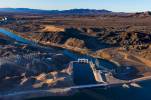A moon-umental business: Las Vegas man sells lunar land

Not long after the end of World War II, science fiction writer Robert Heinlein penned a story about a man who loopholed his way into ownership of the moon, sold pieces of it, and launched a mission to colonize it.
Dennis Hope was a toddler when “The Man Who Sold the Moon” was published in 1950. He had not yet become a car salesman, nor gotten divorced, nor loopholed his way into what he believes is ownership of the moon, nor started selling bits of it for 20 bucks a pop to anyone who finds his Nevada company on the Internet, nor fashioned grand plans to launch a mission to the moon, colonize it and build a civilization in a massive Luxor of glass and titanium.
“If I don’t try it, nobody will,” he said.
He is totally not kidding.
Hope, 65, has gained a ton of notoriety for his idea, or scheme, or business, or novelty shop, depending on your perspective. He’s the subject of a documentary airing this month on Epix, a cable TV channel and website. The documentary, which recently snagged a mention in the New York Times, is called “Lunarcy.”
Many call Hope a con man.
Maybe he is.
Maybe he isn’t.
But he’s taking in money, either way.
Lots of money.
He said he’s selling 225 acres a day, one acre at a time, for $19.99 each, plus $1.51 tax, $2.50 in printing costs and $12.50 shipping. That’s way down from what he used to sell, before the economy crashed.
Since he started in 1980, he said, he’s taken in millions.
“It’s a lot of fun to provide people with hope,” he said. “This is essentially what we’re selling.”
He tells his story like this: It was 1980. He was living in California. Life was not going well. A salesman most of his life, he was between jobs.
An idea struck him. It struck him hard.
He looked up the Treaty on Principles Governing the Activities of States in the Exploration and Use of Outer Space, including the Moon and Other Celestial Bodies, which most people simply call the Outer Space Treaty.
This is a 1967 U.N. treaty that more than 100 nations have signed, including the United States. Its goal is to keep countries from putting nuclear weapons on the moon, or from colonizing it.
But voila, Hope discovered, there’s a loophole: The treaty forbids nations from owning the moon or other celestial bodies. It does not specifically say individual people can’t own it.
And so he declared himself the owner. He notified the United Nations of said ownership. Let me know, he told them, if you have a problem with that.
No one ever let him know they had a problem with that.
So he formed the Lunar Embassy Corp., and later moved its headquarters to Gardnerville, which is about an hour south of Reno, because California taxes are too high. He started selling one-acre plots.
They’re nothing but novelty items, say legal scholars.
“What Lunar Embassy is doing does not give people buying pieces of paper the right to ownership of the moon,” Tanja Masson-Zwaan, president of the International Institute of Space Law, based in the Netherlands, told National Geographic Magazine in 2009.
Messages left last week with the institute were not returned.
Dale Etheridge, director of the planetarium at the College of Southern Nevada and an avid space aficionado, said Hope is not alone in trying to claim ownership of the moon.
There are legitimate endeavors by companies to capture an asteroid and mine it for minerals, which is similar to Hope’s plans. The law in the whole area of space travel and space real estate is ripe for development.
Douglas Grant, a professor emeritus at UNLV’s Boyd School of Law and an expert in property law, was taken aback when asked about Moon law.
Maybe it’s like the settlement of the American West in the 19th century?
No, he said.
Maybe it’s like establishing water rights?
No, he said.
“With the moon, there’s really no analogy,” he said.
He thought for a minute.
“Maybe if you possessed it, you could keep anybody else from messing with it,” he said, because that’s the first stop toward owning something, possession. “But as far as I know, nobody’s possessing the moon.”
He hung up. But then he called back a few minutes later.
He said Jeremy Bentham, the British philosopher often considered the founder of utilitarianism who died in 1832, had something to say about all this: There is no property unless the law says there is.
Without the law, all you’ve got is possession. The law makes it legitimate.
Given that Hope is just a guy who doesn’t even have possession, let alone the law on his side, his case is a little murky.
But none of this fazes Hope. None of it.
The people who oppose him, the people who disagree with him, just don’t know what they’re talking about, he said.
He is going to change the world. He is already doing it.
After he sold millions of acres on the moon, he said, folks started wondering about how to protect their property rights. So they formed a government. They ratified a constitution.
“Now we’re a constitutionally ratified sovereign nation,” he said.
They created a currency, the Delta, which is backed by a helium isotope that theories say is all over the place on the moon. It’s worth lots of money.
“Three point two quintillion U.S. dollars,” Hope said.
He said he’s already working on a spaceship that uses magnetic fields for propulsion. It will travel at 0.99 times the speed of light, so a trip to the moon would be quicker than your morning commute. He’s just got to get the details worked out.
Once there, people will use the moon’s own resources to build a pyramid with a titanium frame and a glass shell. It’ll be huge, 62 billion square feet, so big it will house livestock and oxygen scrubbers and car dealerships and housing for many thousands of people.
This will happen by 2020. Hope will still be alive. He will realize his lifelong dream.
Eventually, people will create an atmosphere on the moon by smashing a bunch of asteroids into it, thereby implanting water vapor.
Hope, who speaks with the clarity and confidence of a man who knows what he is doing, said he has not read the Heinlein story that his life seems to emulate.
Perhaps he should.
Its main character, Delos David Harriman, is wildly successful in convincing the public to support his outlandish plans.
But in the end, he becomes too successful. Forces beyond his control work against him. His moon mission works out, but not for him. He can’t go because the insurance companies won’t cover the danger. He is too valuable.
His success has dashed his own lifelong dream.
Heinlein biographer Bill Patterson pointed out that the story isn’t all that different from the story of Moses. Heinlein had a habit of doing that.
Moses, the legend goes, disobeyed God when the supreme being told him to go speak to a rock to get water for his people. Moses, remembering a trick that worked a few decades back, whacked the rock instead. He whacked it a couple of times and got the water his people needed.
But for not following the rules, for essentially finding and exploiting a loophole, Moses was forever kept from the promised land.
Contact reporter Richard Lake at rlake@reviewjournal.com or 702-383-0307.


















